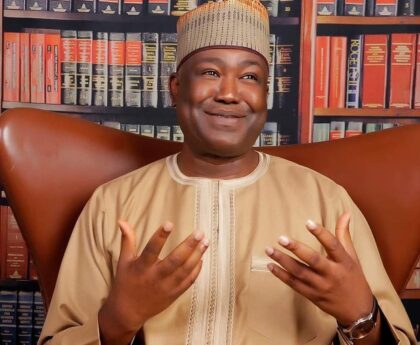By Abdulrazaq Hamzat
Politics often weaves tales of unexpected alliances, and the story of Gbenga Olawepo-Hashim and former military Head of State, General Ibrahim Badamasi Babangida (GCFR), is a compelling example of reconciliation and the transformative power of time.
Olawepo-Hashim, a respected politician, businessman, and former presidential candidate, recently led a delegation to pay a New Year’s visit to Babangida at his Minna residence.
The visit symbolized a remarkable evolution in their relationship, one that once saw Olawepo-Hashim imprisoned during Babangida’s regime.
In the late 1980s, as a fiery student leader and activist, Gbenga Olawepo-Hashim was a vocal critic of Babangida’s administration, which led to his arrest and detention during the height of Nigeria’s pro-democracy struggles.
Despite these past tensions, both men have moved beyond their contentious history to forge a friendship rooted in mutual respect.
Reflecting on the visit, Olawepo-Hashim described Babangida as “still very alert and relevant in the affairs of Nigeria.”
He lauded the former leader’s enduring impact on the country and highlighted how time and shared commitment to national progress had reshaped their dynamic.
The reconciliation between Olawepo-Hashim and Babangida illustrates the possibilities of political maturity and the capacity for personal growth in national discourse. It also serves as a testament to Olawepo-Hashim’s broader philosophy of unity and collaboration, themes central to his #BetterTogetherWithGOH movement.
The relationship between Gbenga Olawepo-Hashim and former military Head of State Ibrahim Babangida (GCFR) draws striking parallels to the reconciliatory approaches of global icons Nelson Mandela and Mahatma Gandhi, both of whom famously transformed personal suffering into platforms for unity and peace.
Like Mandela, who endured 27 years of imprisonment under South Africa’s apartheid regime only to emerge as a champion of reconciliation, Olawepo-Hashim’s political imprisonment during Babangida’s regime could have bred bitterness. Instead, it became the foundation for a renewed relationship rooted in shared patriotism and forward-thinking leadership.
Similarly, Gandhi’s philosophy of non-violence and forgiveness guided his engagement with colonial rulers, emphasizing dialogue over confrontation.
Today, Olawepo-Hashim’s friendship with Babangida reflects a pragmatic embrace of these ideals. The former activist, once imprisoned for opposing military rule, has chosen the path of reconciliation, prioritizing national progress over past grievances. His commitment to unity mirrors Mandela’s emphasis on “truth, reconciliation, and rebuilding a nation on common ground” and Gandhi’s belief that “the weak can never forgive; forgiveness is the attribute of the strong.”
The message from this evolving relationship is clear. Nigeria’s future depends on leaders who can rise above personal histories to embrace a collective vision for peace, prosperity, and unity.
Abdulrazaq Hamzat writes from Ilorin.





